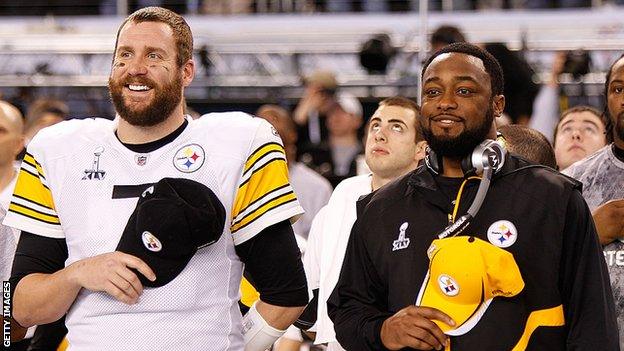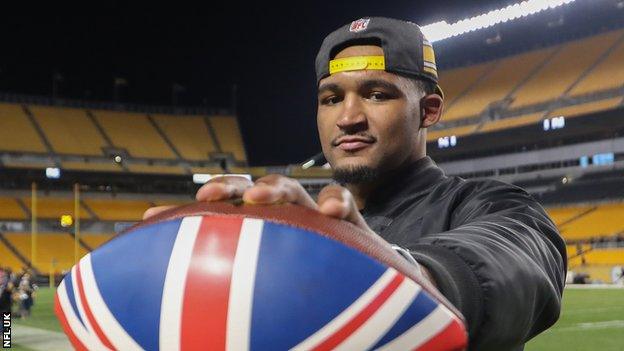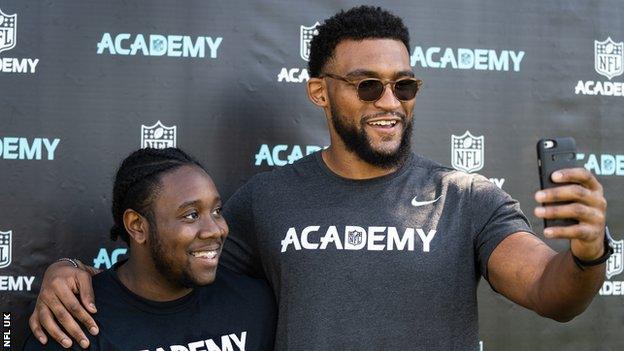Black Lives Matter: How protests forced NFL coach Mike Tomlin to open team debate
- Published

Quarterback Ben Roethlisberger and head coach Mike Tomlin have together led the Steelers to two Super Bowls - winning in 2009, losing in 2011
It was Monday, 1 June - a week after George Floyd's death - and the Pittsburgh Steelers had a team meeting scheduled.
It was supposed to be a regular video meeting, the kind that have become routine for NFL teams during this off-season.
But after events that weekend, the Steelers' head coach Mike Tomlin decided on a change of plan.
There were protests in thousands of cities across the US, external in support of the Black Lives Matter movement, and in Pittsburgh they descended into riots.
"The meeting was just devoted to that topic," Christian Scotland-Williamson, the Steelers' British tight end, told BBC Sport.
"It was an open forum discussion for two hours where all the players were able to voice how they felt. Even the owner and general manager were on the call.
"When you see images like that of George Floyd, it stays in your memory, it's burned in your mind.
"So it was refreshing, from the coach's perspective, to understand that football needed to take a back seat that day. How can you talk about Xs and Os when you're worried if your brother or cousin is going to be shot in their car after being stopped by the police?"
'It's not as if he's a unicorn - there's more like him out there'
Scotland-Williamson feels that ability to gauge the mood of his players is typical of Tomlin. The 48-year-old is the fourth longest-serving coach in the NFL and won the Super Bowl in 2009.
Yet in a league where there's 32 teams and about 70% of the players are black, Asian or minority ethnic (BAME), Tomlin is one of just four BAME coaches.
"His man-management is exceptional, his ability to read people and push the right buttons," said Scotland-Williamson.
"And he doesn't treat black players any different to white players. Within the locker room, it's colourless. His ability to motivate people transcends anything like that, and ultimately that's what coaching at the highest level is about - mobilising your resources and getting them to bond around a common goal.
"I don't think because he's a black coach, he's able to relate to black players any better than anyone else. He's just a great coach who's able to relate to everyone.
"He's had 13 years in Pittsburgh and not had a losing season. That record speaks for itself. And it's not as if he's a unicorn - there are more people like him out there."

Scotland-Williamson quit professional rugby to pursue an NFL career, joining the Steelers in 2018
Scotland-Williamson's maternal grandparents were part of the Windrush generation that left the Caribbean for the UK so "that migrant story is something I've always been taught".
But during lockdown, he's learned about the US civil rights movement and read books about former Steelers owner Dan Rooney - after whom the Rooney Rule is named - and Tony Dungy, the only other black head coach to win a Super Bowl besides Tomlin.
"Understanding Tony Dungy's journey and what he had to overcome, the question that resonates is: Why is it so rare, in a league of 70% black players, for there to be so little black leadership?" asked Scotland-Williamson.
'He's the first black coach I've had since under-sevens football'
The Rooney Rule was introduced in 2003 to ensure a BAME candidate is interviewed for each head coach vacancy in the NFL. Today there's just one more BAME head coach, so the rule was enhanced this year.
The NFL's coaching staff is far more diverse than Scotland-Williamson experienced in rugby though. The 27-year-old played at boarding school and Loughborough University before being signed by Worcester Warriors at 21. The former lock then quit rugby to pursue an NFL career, joining the Steelers in 2018.
"This is the first time I've had a black coach that wasn't my uncle - when I was playing under-sevens football," he said.
"Being coached by Mike Tomlin has been an eye-opening experience. I've never been led by a black person in that context. You have to see something like that to believe it's a possibility, that someone [like you] can have that kind of gravitas and impact.
"When I joined, he said 'I know what this process is going to look like, but you're a Pittsburgh Steeler now, you're not a rugby player anymore, and we're going to hold you to that standard'.
"That was exactly what I needed to hear. I didn't want to be treated differently [because he was new to the sport]. I wanted to feel that anything I got, I earned it."
Helping kids who 'get thrown by the wayside'

When back home, Scotland-Williamson is a regular visitor to the NFL Academy at Barnet and Southgate College
Now Scotland-Williamson is trying to be an example to others, as Tomlin has been to him.
The NFL Academy was launched in London last September, giving 16-to-18-year-olds the chance to study for regular qualifications while also enjoying elite American football training and being mentored by NFL players such as Scotland-Williamson.
Because of the coronavirus pandemic, this year's tryouts are being done by video submissions.
"I've been able to run two races," Scotland-Williamson said. "I was overlooked for [rugby] academies so got financial qualifications. I was still able to play professional rugby but at the same time got a Masters [in International Business].
"It's often portrayed that if you want to be a professional athlete, you can't focus on anything but sport, but I'm working towards changing that mindset, especially for young black kids who get thrown by the wayside.
"The odds of making it to the NFL are very slim, but there's not just professional sport, making music or becoming a doctor or lawyer. There's plenty of careers where you can make £100,000 [a year], that provide fulfilment and financial freedom. You just don't hear about them if people in your circle or network don't have those careers.
"Now that I speak to young men, I try to broaden their horizons about the possibilities beyond sport, and how to use their discipline towards sport as a springboard to something greater in their life."